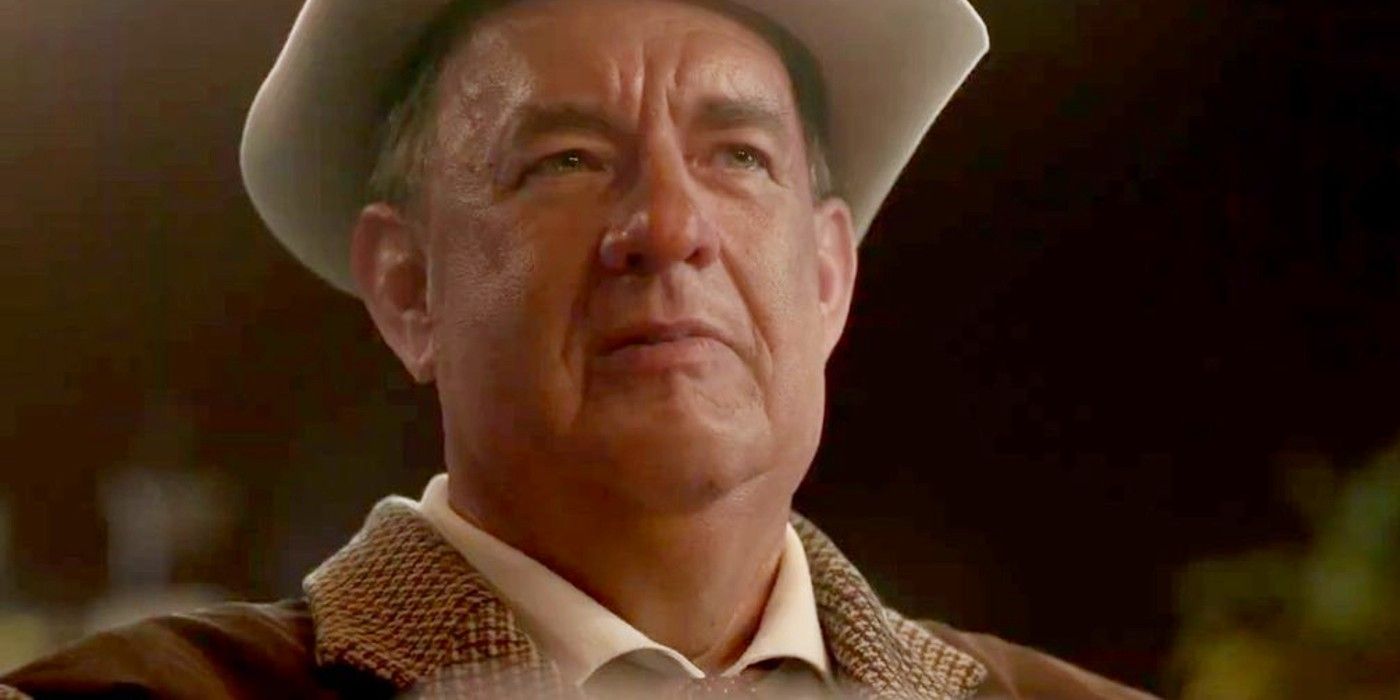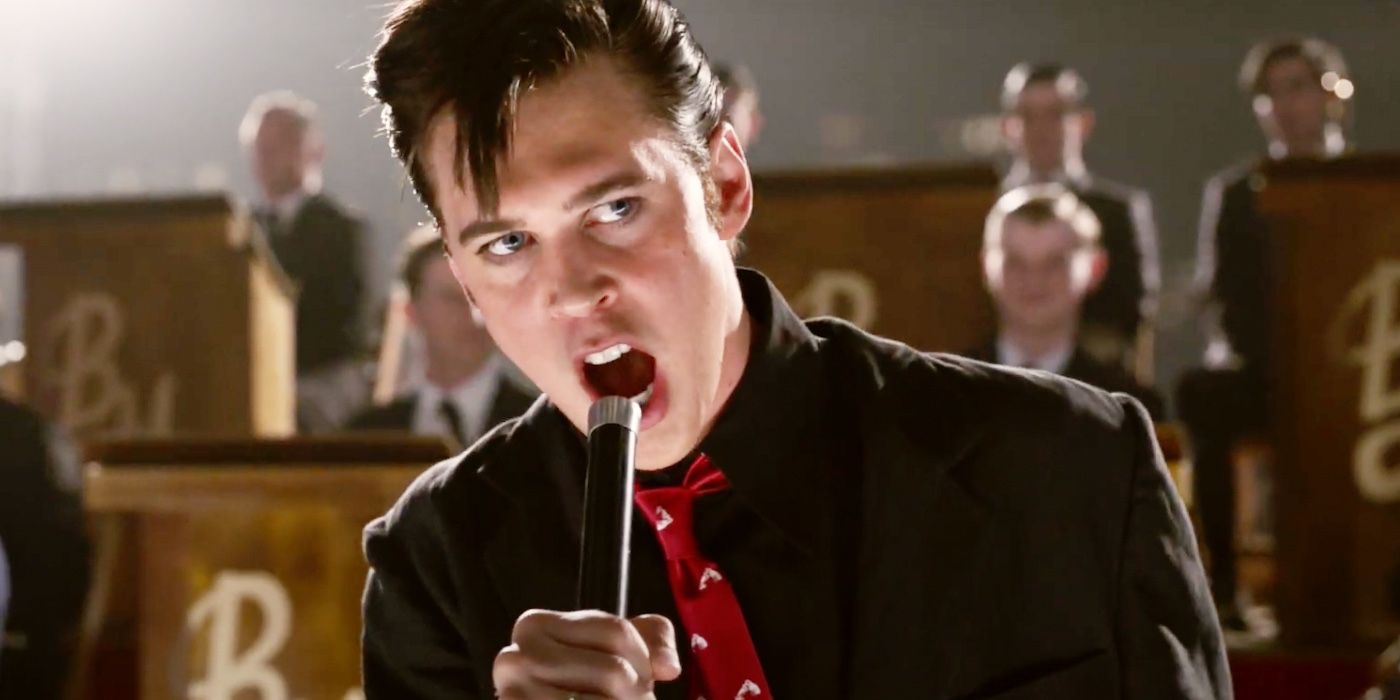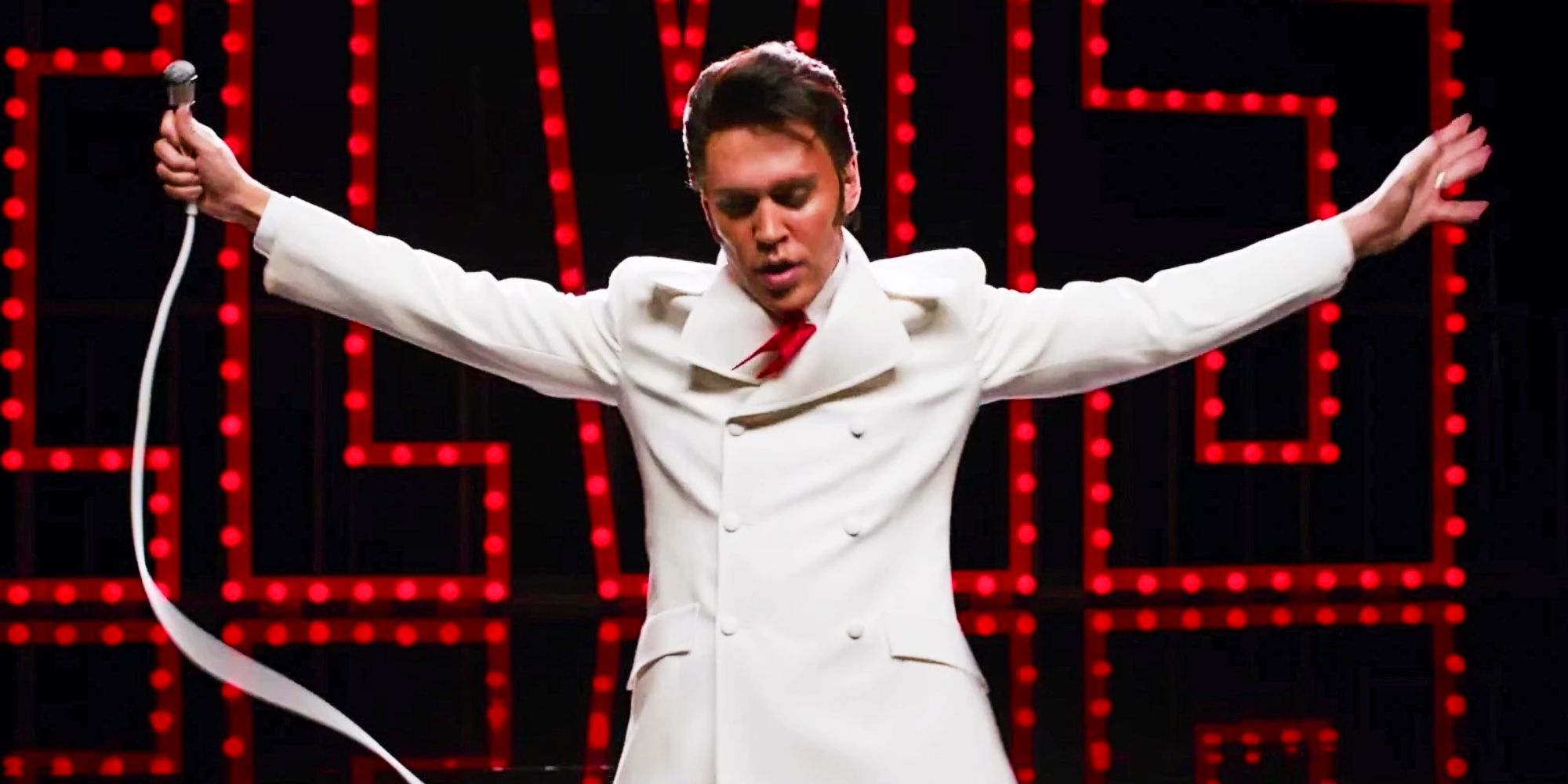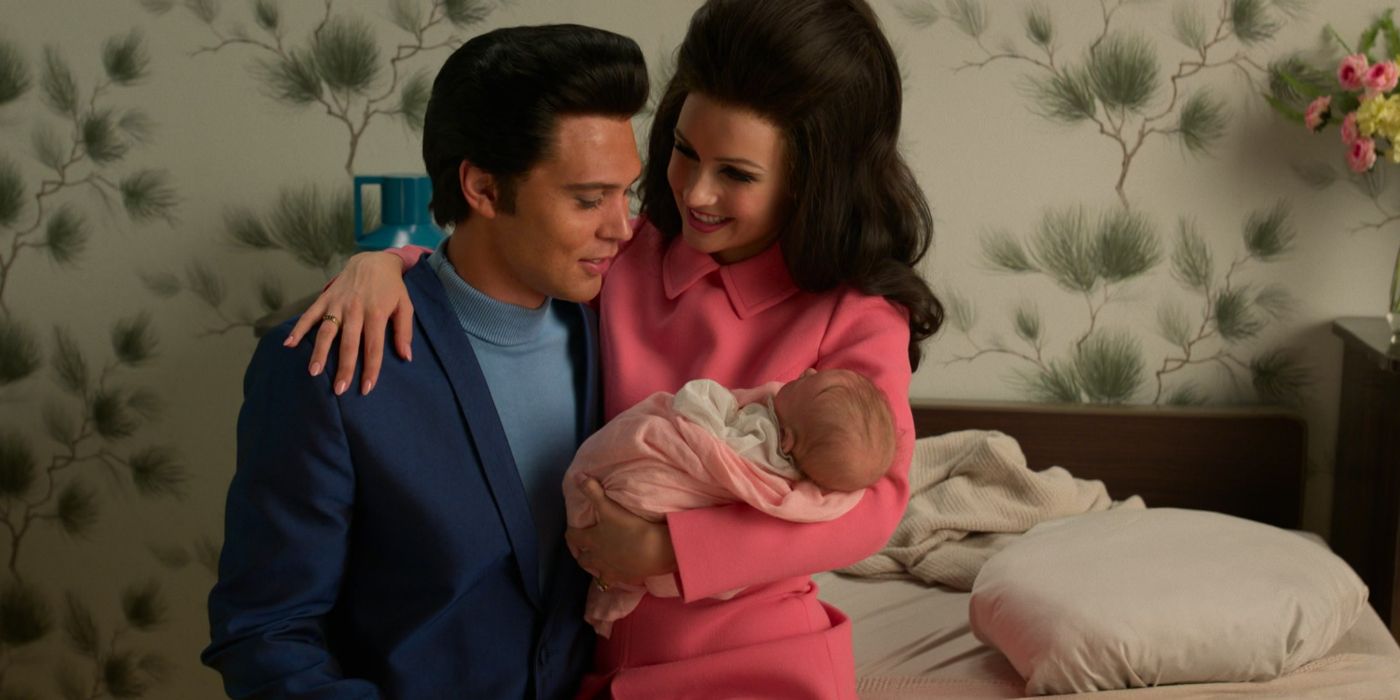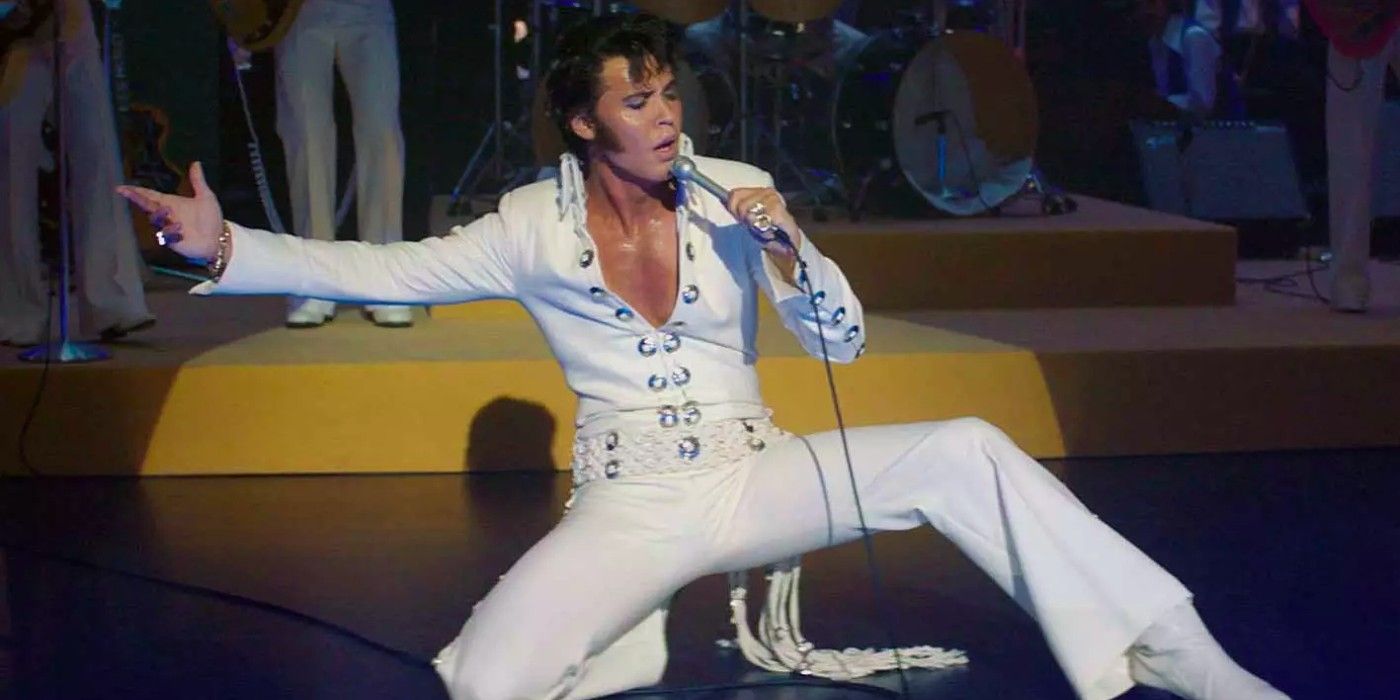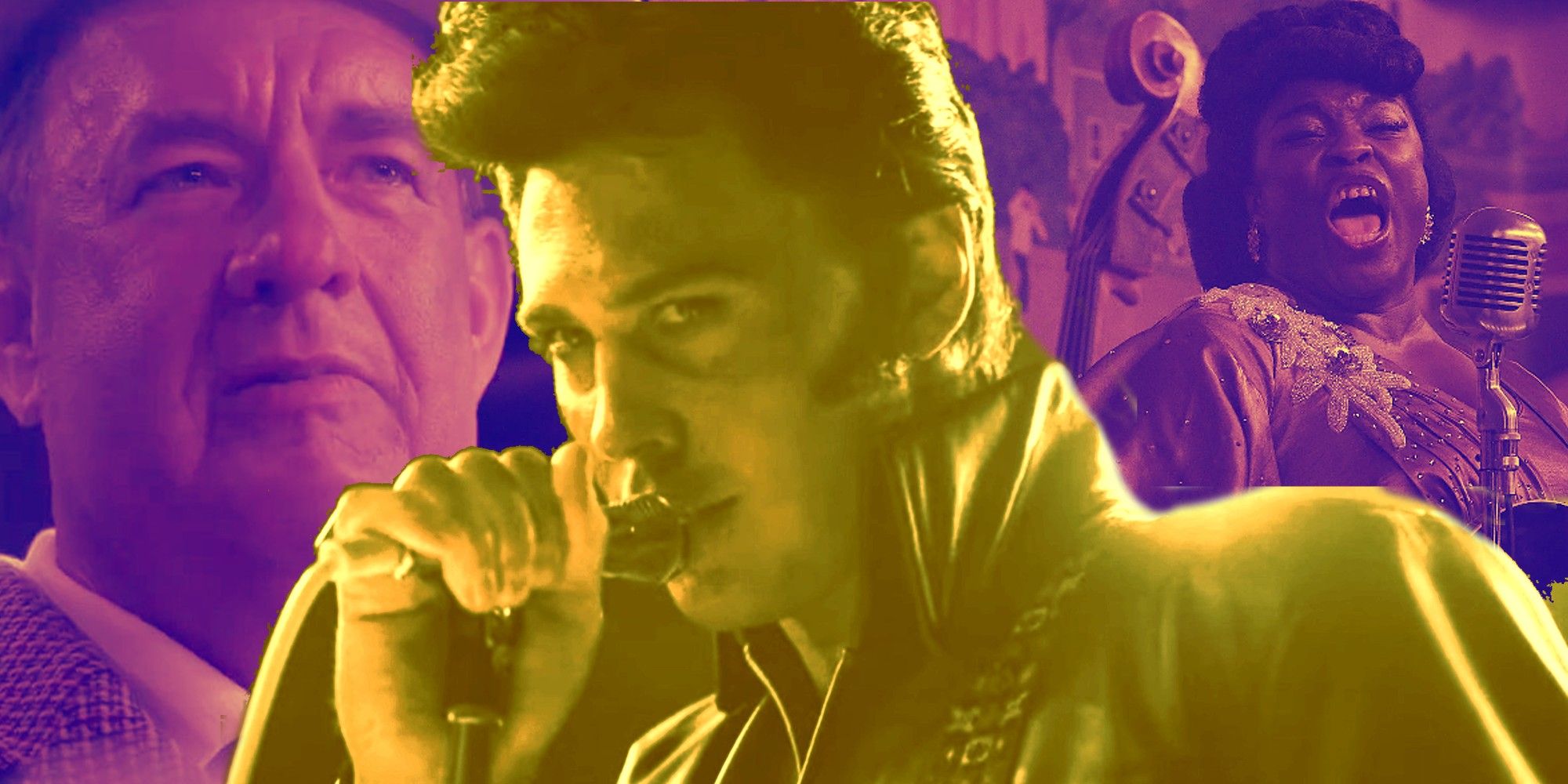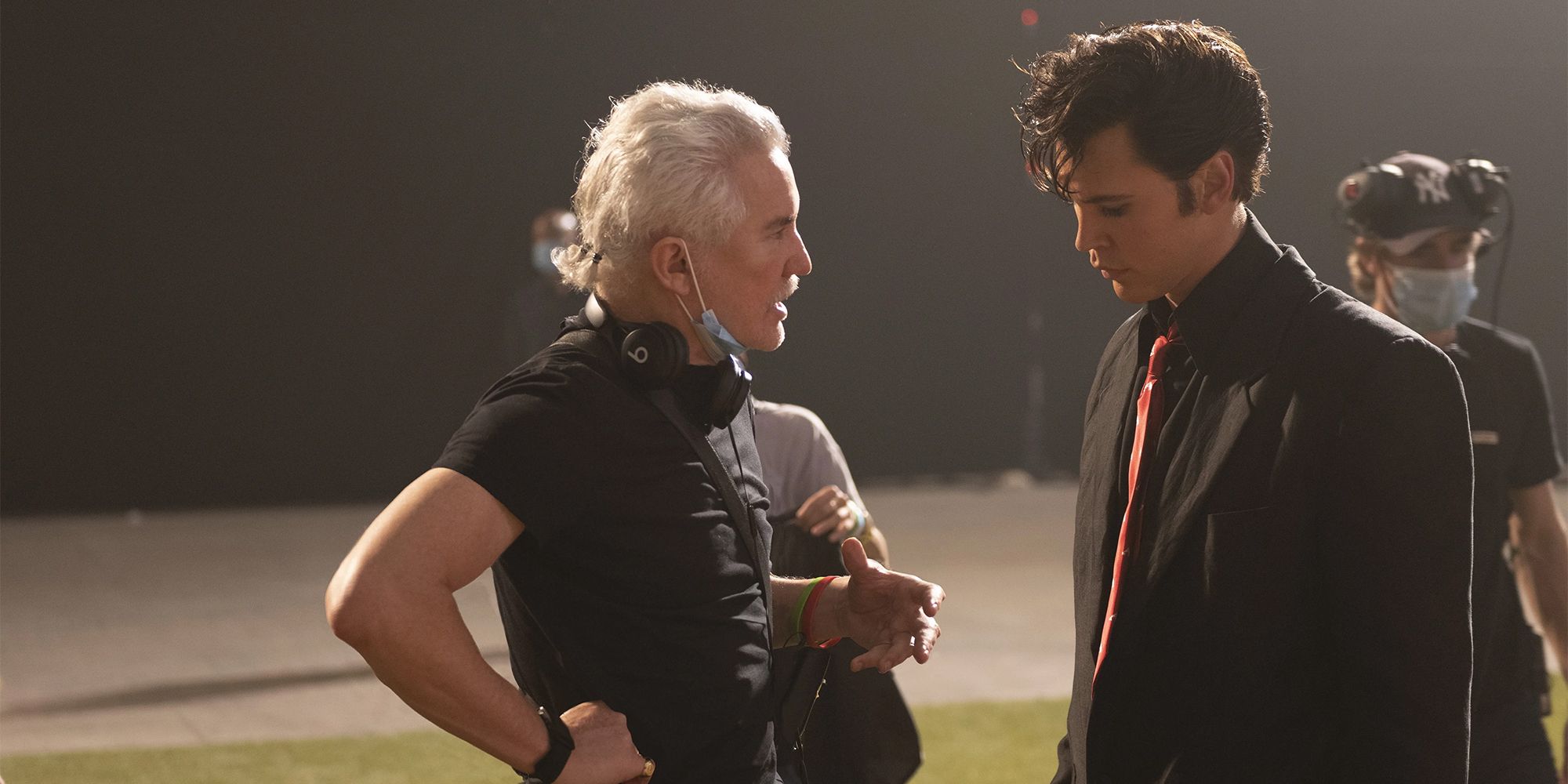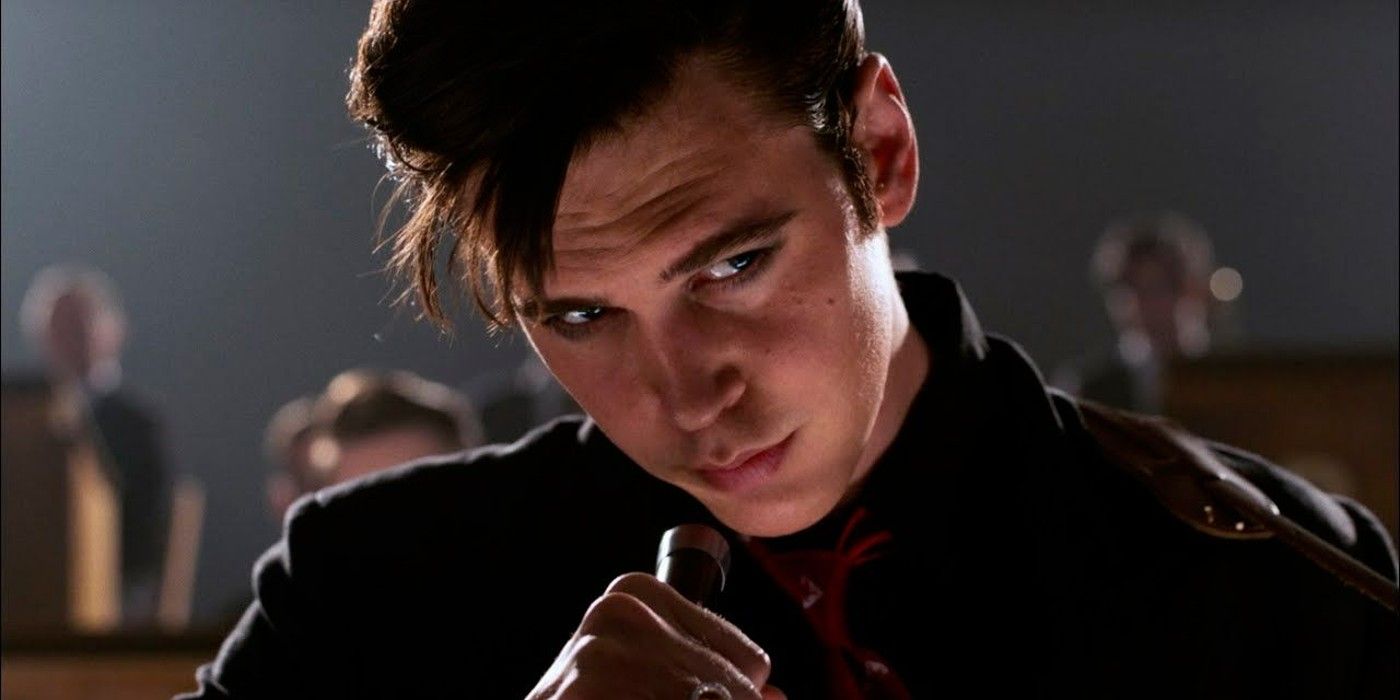Summary
- The Elvis movie takes liberties with the truth, inventing or twisting events to fit the narrative of Colonel Tom Parker as an antagonist.
- The film oversimplifies Elvis Presley's musical influences, relationships, and personal history for the sake of an idolatrous story.
- While not completely accurate, the movie contains enough truth to make it compelling as both art and a version of history, as evident by its Golden Globe win and Oscar nomination.
Given the iconic figure at the center of the hit biopic, many fans wonder how accurate the Elvis movie is. Baz Luhrmann's movie offers an ostentatious look at the life of The King. As with any Luhrmann project, accuracy inevitably gives way to showmanship. Told as a series of flashbacks from the perspective of Colonel Tom Parker (Tom Hanks), Elvis chronicles The King's career from earlier obscurity to international icon. Elvis was a box office hit and earned plenty of award recognition, including nominations for Austin Butler as Best Actor and Best Picture. However, the accuracy of the movie is still in question.
While Elvis Presley and Colonel Tom Parker's relationship was certainly fraught, and even fractious, Elvis doesn't provide a fully-rounded representation of their time together. Some scenes either entirely invent or twist events to suit the narrative of Parker as an out-and-out antagonist. Yet this is not the only area where the new Elvis Presley movie takes liberties with the truth. Both around Elvis' own entertainment journey and his personality as a man, Elvis is guilty of occasionally over-simplifying for the sake of Luhrmann's almost idolatrous story.
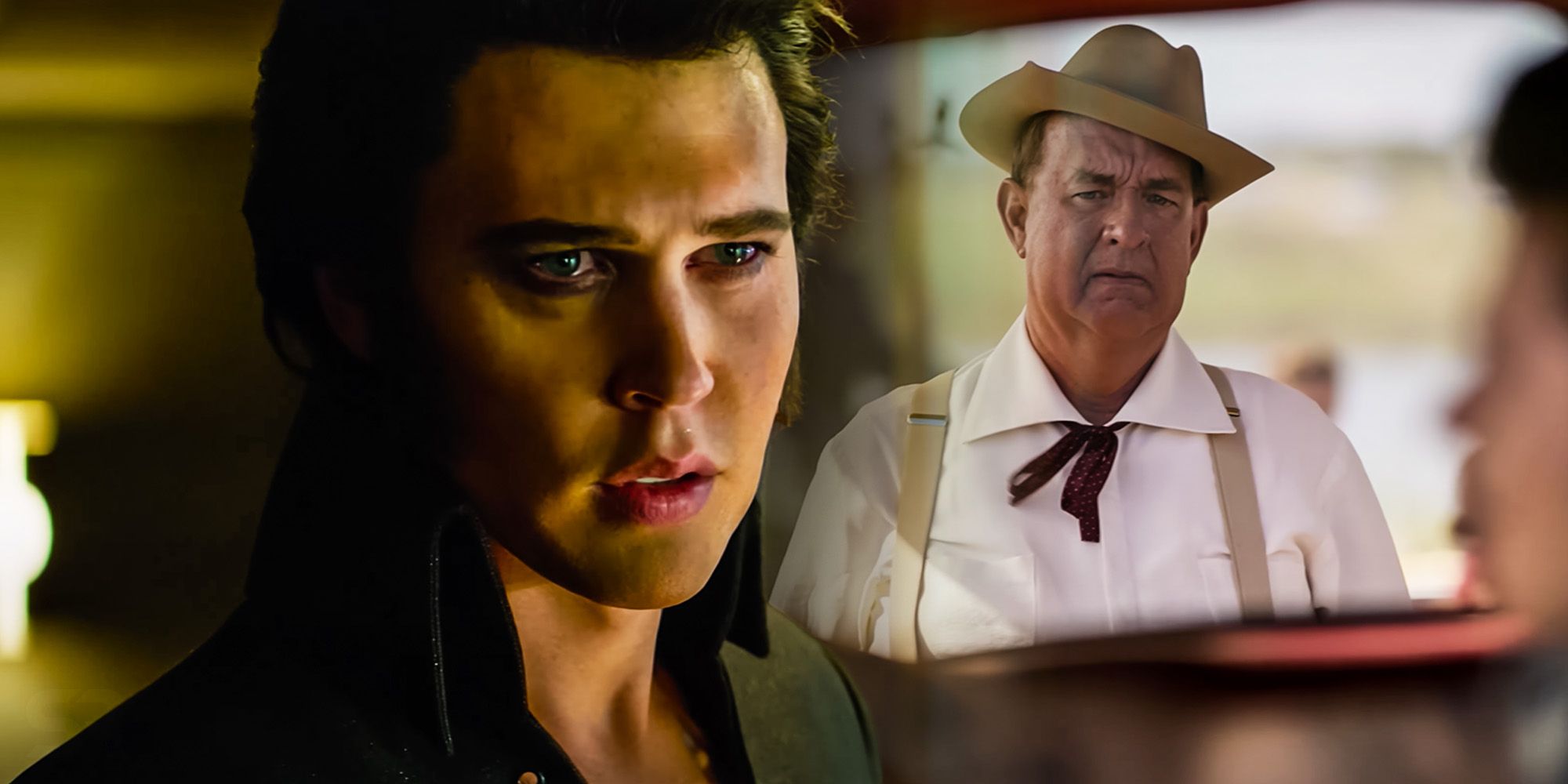
Elvis Ending Explained (In Detail)
Baz Luhrmann's Elvis biopic ends before Elvis Presley's death, instead finishing with The King's Unchained Melody performance in Vegas. Here's why.Elvis' Colonel Tom Parker Changes
Many of the Elvis Presley movie changes center around the controversial Colonel Tom Parker. According to his depiction in the film, Parker was an almost entirely venal, self-interested figure who in many cases actively made suggestions that could have had disastrous consequences, were it not for Elvis' instinctive intervention. For example, relatively early in the movie, Parker attempts to persuade Elvis to tone down aspects of his performance in order to satisfy more conservative quarters.
In an interview (via Variety), biographer Alanna Nash debunked several of Elvis' claims about the manager. When it comes to Parker's desire to tone down some of the singer's more risqué performance antics, Nash points out that the opposite was true:
He liked it that Elvis did what brought folks into the big tent. Listen, this guy was no fool! Parker loved it that Elvis was like a male striptease artist… like the bally girls on the carnivals. That sold tickets!
Similarly, Nash dismissed the assertion that Parker was threatened by the government in a bid to stop Elvis' controversial performances as "total and unequivocal bunk," further highlighting the discrepancies between the movie and historical fact.
How Elvis Changes Elvis Presley
While representing Colonel Tom Parker as an unambiguous villain is probably Elvis' most obvious change, the movie also takes liberties with Elvis Presley himself. In particular, the movie plays fast and loose with some of the real Elvis Presley's most important musical influences, as well as the relationships that shaped him. For instance, Nash explains it isn't true that Elvis' most important musical influences were exclusively Black as the movie implies.
"Elvis had just as many white influences and announced as early as seventh grade that he was going to sing at the Grand Ole Opry. Remember, he entered a talent contest as a child singing 'Old Shep' — warbling about dead dogs is about as country as it gets."
This highlights how, when it comes to the genesis of Presley's undeniable talent, Elvis occasionally oversimplifies. There are also numerous changes made to Elvis Presley as a man. One area that Elvis glosses over is his complicated relationship history. Although his wife Priscilla plays a prominent role, later partners such as Ginger Alden and Linda Thompson are ignored completely, representing a grossly simplistic version of The King's love life.
It's also arguable that the film glosses over the inappropriateness of Presley's overtures when the then Priscilla Beaulieu was just 14 years old, with Nash describing the onscreen representation as "sanitized." The movie attempts to depict the couple as having an epic and touching romance without addressing the problematic aspects. Given the participation of several members of the Presley family in this movie, it is not surprising this approach was taken. As a result, while Elvis does provide some insight into the man, there's no doubt that it is far from documentary in its approach.
Elvis True Story: Military Duty
The popular singer's time in the army is another questionable point. When Elvis had already become a huge star, he made headlines after being drafted and serving in the army as a regular soldier. The movie suggests that Elvis' military service came about as a deal with the government to avoid jail time for his indecent acts on stage. The reality is perhaps more interesting, especially concerning Colonel Parker as the whole scenario was planned by him as a PR stunt to make Elvis appear like an all-American as Nash explains:
He wanted Elvis to go not to Special Services, where the army was happy to put him, but to serve his time as any other soldier. This would sand the rough edges off his image and bring him back as the all-American boy fit for family entertainment with Frank Sinatra. It was all to make him into a beloved pop idol, not a dangerous, lugubrious rock ‘n’ roller.
The movie version of events suggests that Parker is fine with the idea as it will allow him to keep making money off of Elvis while not giving much thought to the danger the young man will face in the war. However, the real reason behind this achieves the same thing and in a more sinister way as Parker uses the idea of war and soldiers fighting to amplify Elvis' image while still giving little thought to the man himself.
Elvis True Story: Elvis' Christmas Special
One of the turning points in the movie is the recording of Elvis' iconic Christmas special in 1968. The movie suggests that the assassination of Robert F. Kennedy took place during the taping of the special, impacting Elvis in a way that he decided to try a new approach. Instead of the straight-forward Christmas show that Colonel Parker wanted, Elvis sang his hits, making for one of his most emotional performances which helped to launch his comeback.
In reality, the assassination of RFK took place during rehearsals for the show and not the actual taping. Despite the movie making it an essential moment of Elvis turning against Parker and challenging him, according to Peter Guralnick, author of multiple Elvis Presley books, Parker was on board with Elvis' version of the special from the beginning.
Elvis True Story: Priscilla Helping Elvis Check Into Rehab
Along with changing some of the more troubling aspects of Elvis and Priscilla's marriage, the movie also plays up her role in Elvis' life after the two got divorced. Priscilla is shown to be a strong presence in Elvis' life and operates as the moral opposite of Colonel Parker who was the negative influence. This is solidified in the movie with the moment in which she helps Elvis seek help for his addiction and check into rehab. However, Nash suggests this was not accurate:
"Priscilla was not as involved with Elvis after their divorce as she would now have people believe."
When previously asked why she didn't pressure Elvis to seek treatment for his addiction, Priscilla said:
"Elvis would no more have responded to an intervention than a demand to give up singing."
Once again, the movie makes changes to make the love story between Elvis and Priscilla a more touching and essential part of his story. While their romance was certainly an important aspect of his life that should have been covered, the extent to which she played a role in the story after their divorce appears to have been exaggerated.

Did Austin Butler Sing The Songs In Elvis? (It's Complicated)
Austin Butler transforms into Elvis Presley in Baz Luhrmann’s biopic, Elvis but whether or not he sings isn't cut and dry.Elvis True Story: Las Vegas Residency
Elvis' career in the movie more or less comes to an end when he agrees to the residency in Las Vegas. The movie suggests that this was another nefarious effort from Colonel Parker that put his own needs before Elvis' career. The movie suggests that Parker arranged for Elvis' at the International Hotel as a way of settling his own gambling debts with the mob. While a lot of Parker's controversies in Elvis are embellished, Nash doesn't outright debunk this bit, confirming that Parker was a notorious gambler and likely did owe a hefty sum to the International Hotel with rumors of a deal struck with local mobsters.
Elvis True Story: Firing Colonel Parker
The relationship between Elvis and Parker comes to a fiery end in the movie when Elvis performs on stage at the International Hotel, first calling out Parker's status as an undocumented immigrant which was the reason he refused to let Elvis tour overseas. He then fires Parker while still on stage. While the event never took place, it was based at least partially in reality. Elvis did have an on-stage meltdown during one of his shows in which he publicly called out the International Hotel for firing an employee Elvis was friendly with, according to Nash. She goes on to explain that Elvis and Parker argued after the show, which is when Elvis fired his manager.
How Accurate Is Elvis?
In many ways, judging Elvis by its commitment to historical authenticity is a mistake. The film is more interested in recapturing the energy and vitality of its star's performances than regurgitating facts from his life. However, even though the truth is sometimes twisted, the movie isn't completely removed from reality. For instance, although the circumstances around Elvis' army stint (which curtailed Presley's musical and acting careers) were changed, it's clear that Parker was pulling the strings away from the front line.
Likewise, Parker was an inveterate gambler who probably did cheat his client of millions of dollars, leading to the acrimony that defined their later relationship. Additionally, Parker really was determined to stop Elvis from touring abroad, in part because he didn't have a US passport due to his immigration status, and he did install Elvis' dad Vernon as a puppet business manager so that he could control everything behind the scenes. This proves that, while Elvis is definitely not a picture-perfect retelling of Presley's life, Luhrmann's biopic contains enough truth to make it compelling as both art and a version of history.
Luhrmann Misunderstood Black Artists' Views On Elvis
The topic of Elvis' success is highly debated among Black artists — something that Baz Luhrmann didn't address in the new Elvis Presley movie. While the film does comment on the fact that Presley "sounds" more like a Black artist, Elvis doesn't necessarily go into how the Black community feels about the appropriation. Ultimately, Black musicians remain divided over Elvis' success in the music business, with some saying that he capitalized off of other Black artists and others claiming that he deserved his fame. Ray Charles has spoken out of Elvis' fame and was particularly critical of the self-appointed King.
In an interview with Bob Costas on NBC, Charles remarked:
"I know too many artists that are far greater. He was doing our kind of music. So what the hell am I supposed to get so excited about?".
While Ray Charles doesn't particularly like Elvis, the movie Elvis did accurately portray the relationship between him and B.B. King. In King's autobiography, Blues All Around Me, the prolific artist had this to say:
"Elvis didn’t steal any music from anyone. He just had his own interpretation of the music he’d grown up on, same is true for everyone. I think Elvis had integrity."
So, because the Black community remains divided on Presley's musical success, the movie Elvis had the chance to explore this dichotomy of opinions, but for whatever reason, chose not to.
Austin Butler's Version Of Elvis Won A Golden Globe And Received An Oscar Nomination
While the Elvis movie isn't accurate in its entirety, it didn't stop the film from soaring the charts and receiving lots of awards recognition. One of the big things that Baz Luhrmann loves to do is get the look of his movies just right. While the director is not someone who is always accurate about his visions, he is a showman at heart. That helped the movie during the Oscar nominations. The movie picked up several nominations for the look of Elvis in the movie, which was very accurate compared to other things in the movie. For the look of Elvis himself, Elvis picked up nominations for Makeup and Hairstyling and Costume Design.
However, as to be expected, all eyes were on the actor tasked with bringing the iconic Elvis Presley to life in the movie. Austin Butler found his breakout role and gave a transformative performance that led to him winning the Golden Globe for Best Actor — Drama followed by an Oscar nomination for Best Actor. The movie itself was also nominated for Best Picture, further cementing its success. While not all facts in the movie are accurate, the accolades prove Elvis captured enough of the story to make for an impressive biopic of a music legend.


